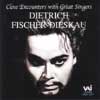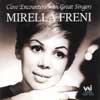Close Encounters with Great Singers - Mirella Freni
View record and artist detailsRecord and Artist Details
Composer or Director: Giuseppe Verdi, Alban Berg, Richard Strauss, Franz Schubert, Aribert Reimann, Richard Wagner, Gustav Mahler
Genre:
Vocal
Label: Video Artists International
Magazine Review Date: 1/2004
Media Format: CD or Download
Media Runtime: 72
Mastering:
Stereo
ADD
Catalogue Number: VAIA1217

Tracks:
| Composition | Artist Credit |
|---|---|
| Winterreise, Movement: No. 1, Gute Nacht |
Franz Schubert, Composer
Dietrich Fischer-Dieskau, Baritone Franz Schubert, Composer Gerald Moore, Piano |
| Lieder eines fahrenden Gesellen, 'Songs of a Wayfarer', Movement: Ich hab' ein glühend Messer |
Gustav Mahler, Composer
Dietrich Fischer-Dieskau, Baritone Gustav Mahler, Composer Philharmonia Orchestra Wilhelm Furtwängler, Conductor |
| (Der) Fliegende Holländer, '(The) Flying Dutchman', Movement: Die Frist ist um |
Richard Wagner, Composer
Bavarian Radio Symphony Orchestra Dietrich Fischer-Dieskau, Baritone Rafael Kubelík, Conductor Richard Wagner, Composer |
| Macbeth, Movement: ~ |
Giuseppe Verdi, Composer
Dietrich Fischer-Dieskau, Baritone Giuseppe Verdi, Composer Vienna Philharmonic Orchestra Wolfgang Sawallisch, Conductor |
| Otello, Movement: Era la notte (Dream) |
Giuseppe Verdi, Composer
Dietrich Fischer-Dieskau, Baritone Giuseppe Verdi, Composer John Barbirolli, Conductor New Philharmonia Orchestra |
| Arabella, Movement: ~ |
Richard Strauss, Composer
Dietrich Fischer-Dieskau, Baritone Joseph Keilberth, Conductor Lisa della Casa, Soprano Richard Strauss, Composer Vienna Philharmonic Orchestra |
| Wozzeck, Movement: Das Messer? Wo ist das Messer? |
Alban Berg, Composer
Alban Berg, Composer Berlin Opera Orchestra Dietrich Fischer-Dieskau, Baritone Karl Böhm, Conductor |
| Lear |
Aribert Reimann, Composer
Aribert Reimann, Composer Bavarian State Orchestra Dietrich Fischer-Dieskau, Baritone Gerd Albrecht, Conductor Julia Varady, Soprano Richard Holm, Tenor |
Composer or Director: Giacomo Puccini, Wolfgang Amadeus Mozart, Georges Bizet, Giuseppe Verdi, Francesco Cilea, Pyotr Ilyich Tchaikovsky
Genre:
Vocal
Label: Video Artists International
Magazine Review Date: 1/2004
Media Format: CD or Download
Media Runtime: 78
Mastering:
Stereo
ADD
Catalogue Number: VAIA1216

Tracks:
| Composition | Artist Credit |
|---|---|
| Carmen, Movement: Je dis que rien ne m'épouvante (Micaëla's aria |
Georges Bizet, Composer
Georges Bizet, Composer Mirella Freni, Soprano Paris National Opera Orchestra Rafael Frühbeck de Burgos, Conductor |
| (La) Bohème, 'Bohemian Life', Movement: ~ |
Giacomo Puccini, Composer
Giacomo Puccini, Composer Mirella Freni, Soprano Nicolai Gedda, Tenor Rome Opera Orchestra Thomas Schippers, Conductor |
| Don Giovanni, Movement: Vedrai, carino |
Wolfgang Amadeus Mozart, Composer
Mirella Freni, Soprano New Philharmonia Orchestra Otto Klemperer, Conductor Wolfgang Amadeus Mozart, Composer |
| Adriana Lecouvreur, Movement: ~ |
Francesco Cilea, Composer
Antonino Votto, Conductor Francesco Cilea, Composer Milan La Scala Orchestra Mirella Freni, Soprano |
| Otello, Movement: Ave Maria |
Giuseppe Verdi, Composer
Berlin Philharmonic Orchestra Giuseppe Verdi, Composer Herbert von Karajan, Conductor Mirella Freni, Soprano |
| Madama Butterfly, Movement: ~ |
Giacomo Puccini, Composer
Giacomo Puccini, Composer Herbert von Karajan, Conductor Luciano Pavarotti, Tenor Mirella Freni, Soprano Vienna Philharmonic Orchestra |
| Eugene Onegin, Movement: Let me perish, but first let me summon (Puskai pogo pryezde) |
Pyotr Ilyich Tchaikovsky, Composer
James Levine, Conductor Mirella Freni, Soprano Pyotr Ilyich Tchaikovsky, Composer Staatskapelle Dresden |
| Aida, Movement: ~ |
Giuseppe Verdi, Composer
Agnes Baltsa, Mezzo soprano Giuseppe Verdi, Composer Herbert von Karajan, Conductor José Carreras, Tenor Mirella Freni, Soprano Vienna Philharmonic Orchestra Vienna State Opera Chorus |
Composer or Director: George Frideric Handel, Hector Berlioz, Benjamin Britten, Richard Wagner, Giuseppe Verdi, Richard Strauss
Genre:
Vocal
Label: Video Artists International
Magazine Review Date: 1/2004
Media Format: CD or Download
Media Runtime: 69
Mastering:
Stereo
ADD
Catalogue Number: VAIA1218

Tracks:
| Composition | Artist Credit |
|---|---|
| (Les) Troyens, '(The) Trojans', Movement: Nuit d'ivresse et d'extase infinie! |
Hector Berlioz, Composer
Colin Davis, Conductor Hector Berlioz, Composer Jon Vickers, Tenor Josephine Veasey, Mezzo soprano Royal Opera House Orchestra, Covent Garden |
| Otello, Movement: ~ |
Giuseppe Verdi, Composer
Berlin Philharmonic Orchestra Giuseppe Verdi, Composer Herbert von Karajan, Conductor Jon Vickers, Tenor Mirella Freni, Soprano |
| Tristan und Isolde, Movement: Wie sie selig |
Richard Wagner, Composer
Buenos Aires Colón Theatre Orchestra Horst Stein, Conductor Jon Vickers, Tenor Richard Wagner, Composer |
| Messiah, Movement: Every valley shall be exalted |
George Frideric Handel, Composer
George Frideric Handel, Composer Jon Vickers, Tenor Royal Philharmonic Orchestra Thomas Beecham, Conductor |
| Peter Grimes, Movement: Steady! There you are! |
Benjamin Britten, Composer
Benjamin Britten, Composer Colin Davis, Conductor Jon Vickers, Tenor Royal Opera House Chorus, Covent Garden Royal Opera House Orchestra, Covent Garden |
| Enoch Arden |
Richard Strauss, Composer
Jon Vickers, Tenor Marc-André Hamelin, Piano Richard Strauss, Composer |
Author: Richard Osborne
Jon Tolansky’s ‘Close Encounters with Great Singers’ is a made-for-radio project. Each programme runs for some 70 minutes, with a 50-50 division of words and music using seven or eight carefully chosen musical excerpts as cues for conversation. It works well, though collectors will be annoyed to find that VAI has placed talk and music on a single track within each topic area. If, later, you want direct access to the music, you will need to annotate the booklet and scroll on through the chat.
This is not the place to reveal the close detail of these conversations. Suffice it to say that the Fischer-Dieskau interview is a classic of its kind, that the Vickers, though less ‘finished’ as a conversation piece, is laden with interest, and that the Freni disc contains some glorious singing.
Tolansky is a sophisticated and articulate interviewer, a connoisseur of operatic interpretation, whose only failing is a tendency to out-think and out-talk his subject. In Fischer-Dieskau he meets his match: a man of wit and erudition, who, even when speaking in English, has a lawyer’s ear for the niceties of argument. The conversation, which is worth hearing simply as a conversation, ranges over opera and song, conducting and teaching, with some memories of Benjamin Britten thrown in for good measure.
Buried within the Fischer-Dieskau conversation are two pieces of bad news for readers of Gramophone. The first, for collectors, is his belief that all his recordings of Schubert’s Winterreise have something to say but that none gets close to saying it all. The second, for the ‘industry’, is that 10 years ago his pupils would arrive knowing the relevant recordings. Now they arrive knowing none. The post-1980s generation of aspiring musicians, he suggests, doesn’t buy records and doesn’t have much interest in learning from them.
Jon Vickers is a compelling subject but will always be an uncomfortable one for unbelievers and moral relativists. The story of how he came to be a professional singer is fascinating but Vickers the musical zealot is trickier to handle. When I was writing my Karajan biography I spent several days with him at his home in Bermuda. I recorded nothing and made no notes, except retrospectively each evening. Quoted out of context, he can seem extreme; taken ‘in the round’ he is a man of deep and penetrating humanity. The Tolansky interview is no more than a snapshot: vivid in places, out of focus in others. The Beecham reminiscences are superb, the anatomising of the character of Peter Grimes – something that has always caused much grinding of the teeth among the Aldeburgh faithful – is extraordinarily powerful. (The contents of Vickers’ magnificent library confirmed for me his interest in Crabbe’s original poem.)
Mirella Freni is a glorious singer and this programme is full of wonderful music-making. Her English is good enough for her to tell a couple of stories well (the account of Karajan auditioning her for the role of Mimì is riveting) but often she struggles to express herself clearly. Here Tolansky turns his connoisseurship to advantage, feeding Freni with ideas about her (and in some instances, Karajan’s) interpretations of the music of Puccini and Verdi which are not her own but probably would be if she had the words to express them.
That said, even in her native Italian, Freni might find it difficult to explain the inexplicable. What emerges about Karajan is what Vickers also told me about him and Knappertsbusch and Kempe and others of that era: that interpretation was rarely discussed. Rather, it was conveyed through sound and gesture, and a musical relationship born of thorough schooling, intuition and trust. The last thing they did was talk.
Discover the world's largest classical music catalogue with Presto Music.

Gramophone Digital Club
- Digital Edition
- Digital Archive
- Reviews Database
- Full website access
From £8.75 / month
Subscribe
Gramophone Full Club
- Print Edition
- Digital Edition
- Digital Archive
- Reviews Database
- Full website access
From £11.00 / month
Subscribe
If you are a library, university or other organisation that would be interested in an institutional subscription to Gramophone please click here for further information.




